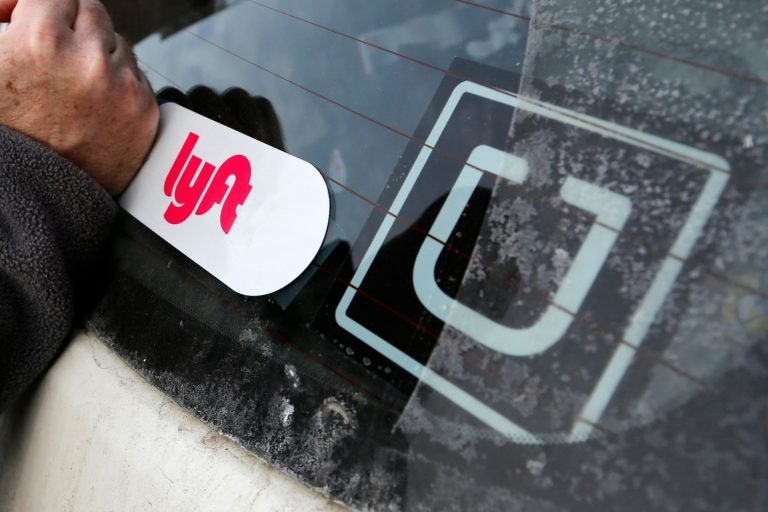Revamping N.J. labor law to protect workers in ‘gig economy,’ boost state taxes
Senate President Steve Sweeney is behind a bill that’s ‘all about protecting the rights of workers,’ but business interests have misgivings.

In this Jan. 31, 2018, file photo, a Lyft logo is installed on a Lyft driver's car next to an Uber sticker. (Gene J. Puskar/AP Photo, file)
This article originally appeared on NJ Spotlight.
—
State lawmakers are considering updating New Jersey labor law to boost worker protections and prevent companies in the so-called gig economy from misclassifying workers as independent contractors.
Legislation cleared a Senate committee last week seeking to expand the state’s definition of what constitutes an official “employee” of a company to include those who aren’t typically in the office or “place of business” of the employer. That is intended to keep companies from misclassifying their workers as “independent contractors.”
The expanded definition is an important one for both workers and the state, according to the bill’s sponsor, Senate President Steve Sweeney (D-Gloucester). Independent contractors generally don’t get the same benefits from employers as employees do; companies also don’t have to contribute payroll taxes on their behalf to the state for things like unemployment insurance. Sweeney said the bill will codify in law the state’s existing regulations.
“This is a pro-worker bill for the new gig economy,” Sweeney said. “It’s all about protecting the rights of workers.”
Labor organizations like the AFL-CIO, which have long called for a crackdown on employee misclassification, have praised the proposed policy change. But New Jersey’s leading business-lobbying groups have come out in force to oppose Sweeney’s legislation, suggesting it could upset the state economy and give companies that can leave New Jersey for states with cheaper taxes and less restrictive regulations one more reason to do so.
The $650M Uber question
Even as Sweeney’s bill is drawing debate in Trenton, a recent report published by Bloomberg Law revealed the state Department of Labor has been seeking nearly $650 million from Uber, a popular, app-based ride-hailing company. At issue is the classification of Uber’s drivers. The state is seeking to recoup assessed disability and unemployment insurance payments, and interest, for what it considers to be Uber employees, Bloomberg Law reported. (The company is contesting the state’s assessment, the report said.)
The proper classification of workers in New Jersey has long been a concern for state labor officials, and last year, Gov. Phil Murphy convened a task force to examine the issue. That panel issued a report earlier this year, which proposed dozens of remedies, including more training for state Division of Consumer Affairs employees and information-sharing among neighboring states like Delaware and Pennsylvania to catch companies that deliberately misclassify workers.
In addition, a Labor department audit last year also found that 12,315 workers in New Jersey were misclassified, $462 million in wages were underreported and $13.9 million in contributions to unemployment, disability and family-leave insurance funds were not properly made. That audit was of just 1% of employers.
The recent scrutiny also followed a 2016 Stockton University report that looked specifically at the construction industry, detailing how construction companies often give their workers a 1099 tax form as if they were self-employed so the company can avoid paying mandatory payroll taxes.
“Businesses that misclassify may also evade labor laws such as minimum and prevailing wages, overtime payments, and laws that protect collective-bargaining rights,” the report said.
Concerns about misclassification of workers
As app-based services like Uber have grown in popularity, concerns about misclassification have widened. California and New York are among the states where reforms have also been pursued to modernize regulations and close perceived loopholes.
Current New Jersey law — which was last updated about a decade ago — looks at several factors to test whether a worker is a company employee or providing services on a contract basis. These include who determines the worker’s hours and when and where their services are provided. State law also gives employers the burden of establishing that a worker is not a bona fide employee and should instead be treated as an independent contractor.
Sweeney’s proposed legislation would make it clear that a worker could be considered a company employee even if they do work “outside of all the places of business of the enterprise for which the service is performed.” The legislation would also cover a worker who “is customarily engaged in an independently established trade, occupation, profession or business of the same nature as that involved in the work performed.”
Eric Richard, legislative affairs director for the AFL-CIO labor-advocacy organization, was among those who testified in favor of Sweeney’s legislation before it cleared the Senate Labor Committee in a 3-1 vote last week. Even though gig-economy companies have brought new attention to the misclassification issue, it has been a key concern for labor officials for decades, Richard said.
Misclassifying a worker as an independent contractor not only deprives the state of contributions to funds like those that support unemployment and disability benefits, it also exempts the employer from abiding by worker-protection regulations like minimum-wage and overtime rules, Richard said.
“These all apply to employees, but they do not apply to independent contractors,” he said.
Exemptions already for some types of work
Fred Potter, an international vice president with the Teamsters labor organization, said that keeping workers classified as independent contractors prevents them from organizing and joining labor unions since they aren’t employees of the company. It also shifts costs onto the worker, Potter said. That’s especially important for truck drivers who must cover such costs as gas and tolls that could otherwise be covered by the companies, he said.
“It puts all the cost of business on the (trucker),” Potter said.
But Christina Renna, senior vice president of the Chamber of Commerce of Southern New Jersey, said the proposed new definition of an employee would impact a host of businesses, including small businesses that often rely on contract workers and even provide contract work themselves.
“I have a special concern for my small businesses and my microbusinesses and my entrepreneurs,” Renna said. “It’s going to change how businesses across the board conduct all aspects of their businesses.”
Michael Egenton, executive vice president of the New Jersey Chamber of Commerce, suggested the legislation could encourage companies to flee the state if they are able to.
“At the end of the day, employers make those decisions (and) if those challenges are compounded, they may look at other places than New Jersey,” Egenton said.
The proposed policy change could also upset the way emergency roadside services are provided across New Jersey by the AAA organization using a decades-old business model that relies on affiliated independent contractors to reach stranded motorists who need help with things like a flat tire or dead battery.
Tracy Noble, manager of public government affairs for AAA’s mid-Atlantic region, said Sweeney’s proposal would have “a severe (and) detrimental impact” on the delivery of those widely used services.
“Last year alone we responded to nearly 1 million emergency assistance calls across the state,” she said.
Noble is seeking an exemption for AAA services since the bill already provides exemptions for some types of work, including for the accounting and real-estate industries.
WHYY is your source for fact-based, in-depth journalism and information. As a nonprofit organization, we rely on financial support from readers like you. Please give today.




